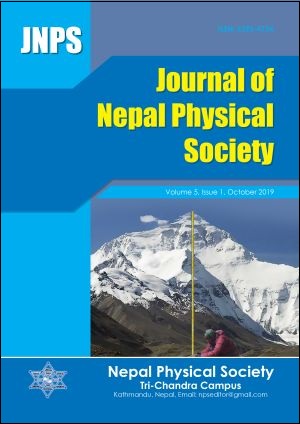Damage Formation and Calculation of Energy Loss during Implantation of Antimony and Boron Ion in Silicon Target
DOI:
https://doi.org/10.3126/jnphyssoc.v5i1.26939Keywords:
Ion implantation, Semiconductor, Doping statistics, Stopping power, Ion range, Defect concentrationAbstract
The aim of this research work is a computational study of damage profile and visualization of the ion implantation graph obtained from the simulation method using SRIM-2013 software. SRIM (Stopping and Range of Ions in Matter) helps in calculating the energy required for an ion to obtain maximum concentration for desirable range and TRIM (Transport of Ions in Matter) is used to calculate doping statistics and calculation of energy loss. The main objective of this work is to get knowledge about the graphical study of ion range, distribution, stopping power and energy loss during implantation of antimony and boron ion on the silicon target within 0 to 3500 Å target depth. The implantations of 10,000 antimony and boron ions are accelerated by 350 keV and 45 keV energy in silicon monolayer target to obtain maximum defects concentration. The result of the ionization process indicates that 11.68% of the total energy of antimony ion and 65.25% of the total energy of boron ion are lost during the ionization process. This indicates that lighter boron ion causes more ionization than the heavier antimony ion for the same projected range.
Downloads
Downloads
Published
How to Cite
Issue
Section
License
All right reserved. No part of this Journal may be reproduced in any form or by any electronic or mechanical means, including information storage and retrieval system, without permission in writing from the publisher, except by a reviewer who may quote brief passage in a review. The views and interpretation in this journal are those of author(s) and they are not attributable to the NPS.




